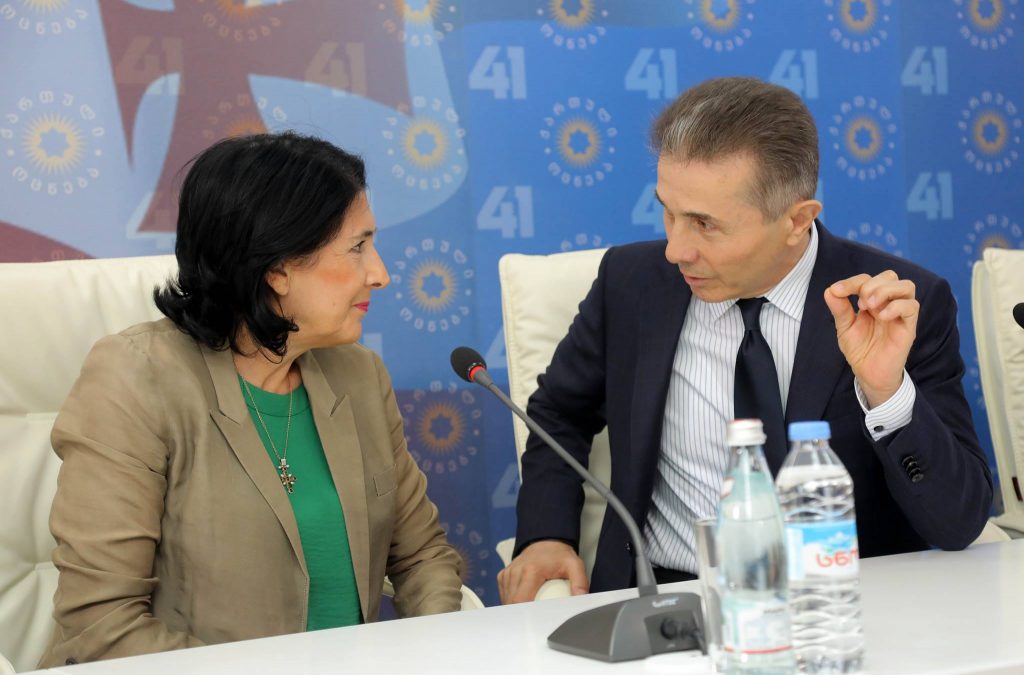Less than a month before the October 28 presidential elections, chairman of the ruling Georgian Dream-Democratic Georgia party and former prime minister, Bidzina Ivanishvili, voiced his support to the GDDG-endorsed candidate Salome Zurabishvili.
Ivanishvili made the announcement at a gathering of party leadership on October 1, convened for marking the six anniversary of the Georgian Dream coalition’s electoral victory over ex-President Mikheil Saakashvili’s United National Movement.
In a seven-minute address to the party leaders, published by the GDDG press service after the meeting, Ivanishvili said the “forces” running the country before 2012 “are, unfortunately, still trying to make our society live in a virtual reality.”
“They are trying to shift the blame on the crimes they have committed onto the Georgian Dream and the Georgian Dream-endorsed candidate,” the GDDG leader said, referring to the criticism that followed Zurabishvili’s controversial remarks on the Russo-Georgian war.
“The biggest crime committed by the United National Movement … was their position during the 2008 war and the loss of 20% of the Georgian territory; you remember full well how they acted [back then], how they left behind the dead soldiers, as well as those alive,” he stressed.
“This is what they are peddling today; they are trying to shift the blame onto a presidential candidate, Salome Zurabishvili, who did a lot during her professional career to ensure that the Russian army would leave the territory of Georgia,” he added.
“I remember very well how principled Salome Zurabishvili was during her tenure as the minister of foreign affairs, how consistent and crafty she was in ensuring that the Russian army would leave the country,” Ivanishvili also said, adding that it was ex-President Mikheil Saakashvili who “led the Russians back to Georgia and left 20% of the country occupied.”
“It is highly appalling that these people, these traitors, are trying to blame us and are trying to label Salome Zurabishvili as a traitor,” the GDDG leader also noted.
Ivanishvili slammed the opposition for “drawing parallels” between the cases of Girgvliani and Saralidze. “Those who committed such crimes are trying to accuse the current ruling party and are trying to make it identical to a teen brawl,” he said.
The GDDG leader also touched upon businessman Zaza Okruashvili’s extortion allegations. Ivanishvili confirmed he met Okuashvili, but stressed it was solely to assist him, “like we would do in case of any other businesses.” “We are doing our best to support the business,” Ivanishvili said, adding that Okuashvili’s claims against him were “ludicrous.”
He then spoke on the upcoming presidentials, saying with “right [electoral] mobilization, we will manage to win the elections.”
“For me, Salome Zurabishvili is a symbol of contemporary Georgian history – a representative of the first emigration, a descendant of Niko Nikoladze. She also fits well within our great and lengthy history – that we had a women running the country already in the XII century,” Ivanishvili said, referring to Tamar, a female monarch of Georgia.
“I call on all of you to mobilize and show your best abilities, to stand with our dear Salome Zurabishvili and bring her to victory,” Ivanishvili told the GDDG leaders.
Salome Zurabishvili spoke at the meeting as well, thanking the GDDG for “taking a truly democratic step,” and endorsing her candidacy for the upcoming presidential elections.
“This would not be an ordinary decision in any of the European countries that a ruling party refuses to take a post, one of the most important institutions in the country and lets the presidential office to an independent candidate; perhaps, the society is not yet fully aware of how progressive this step is in the XXI century,” the presidential-hopeful said.
- Salome Zurabishvili, Georgia’s Foreign Minister in 2004-2005, joined the presidential race on August 6. The ruling Georgian Dream-Democratic Georgia announced that it would endorse her candidacy on September 9.
- On October 28, Georgian citizens will elect their fifth president for a six-year term. This will be the last time that the head of state will be elected through direct ballot. According to the new constitution, which will enter into force following the presidential elections, the new President will be elected by the 300-member Electoral College for a term of five years.
This post is also available in: ქართული (Georgian) Русский (Russian)

